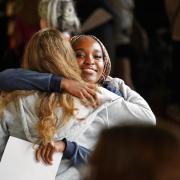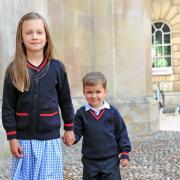Chris Packham, Michaela Strachan and Megan McCubbin share tips on exploring the outdoors this season as a family.
BBC’s Springwatch has returned with presenters Chris Packham and Michaela Strachan broadcasting mainly from RSPB Arne Nature Reserve in Dorset.
This year, live nest cameras have been set up across the springtime location and will highlight how the smallest action to help wildlife can have a massive impact, for three weeks of live programming on BBC Two and iPlayer.
Chris Packham, who has presented the show since 2009, said: “The only thing that we can guarantee is that we will see something that we’ve not seen before, as that always happens.
“Dorset wildlife has a sort of speciality there because a lot of Arne is sandy lowland heath.”
This year’s show will also include Iolo Williams and Megan McCubbin, who will be based in Scotland to discover as much as she can and explore the underwater habits of seals.
And the presenters are keen to inspire families to get out in nature and be aware of the wildlife around them.
So how can parents get their kids interested?

Know what to look for this time of year
Packham says spring is all about the first butterflies.
“I had a great day yesterday when there were brimstone butterfly about, absolutely my favourite butterfly by far. Also yesterday I had first orange tips and holly blue butterflies.
“You get a real sense of things happening when those species appear and it’s a joy to see them and they’re all familiar species that can appear in just about everyone’s back garden.”
Birdsong is also coming to its peak and you may get a dawn chorus if you live in an area with a density of birds.
“One species to really listen out for are blackbirds,” Packham says. “Another is song flushes, I call them the urban nightingale. Their rich, fluid and melodic song is really special and again they’re widespread across the UK, you can find them in urban as well as rural areas.”
And if you live near the coast, McCubbin says: “A favourite spring spectacle of mine has got to be the return of the seabirds to our coastlines. The sound, the smell, the chaos… it’s fabulous.
“I love watching the puffins, razorbills, guillemots and gannets going about their business raising a chick in such a seemingly tough environment.”
Don’t demonise devices
Packham knows kids and young people are glued to devices – but that doesn’t have to be a bad thing when it comes to appreciating nature,
“I use my phone all the time, I use my phone to identify species. There [are] some good birdsong apps that work pretty well and they are improving. I’ve also got a device that plugs into my phone and it becomes a bat detector.”
“So I think there was an idea that we should keep young people away from their devices because they disconnect them from nature. But in fact, I would argue mine connects me with nature.”
He has field guides in apps his phone, rather than in print.
“I mean, I kept my books, but most of those books when it comes to UK and European wildlife, have been translated into apps that are usable on my phone.
“I think it’s about retraining those young people to make sure that they understand how useful those apps can be.”

Use social media to inspire them
Strachan admits that it’s getting harder and harder to get kids connected with wildlife, due to the evergrowing competition between engaging with wildlife and the various social media platforms kids use.
“So I think the way to get kids into nature is by using social media to inspire them,” said Strachan.
“I think we’ve just got to find new ways of keeping kids connected, most kids are born with a fascination for wildlife. So the challenge is not to let kids disconnect with that, you know, to keep them with that fascination and I also think we just need inspiration from young people. And we’re doing that more and more on the show.”

Allow them to take charge
McCubbin thinks parents should allow their children to “take the lead” to get them interested in nature.
“When you’re outside, let them lead the way and explore what interests them the most. They might gravitate to the meadow, a pond or the woods, they might wish to dig in the soil or climb a tree,” she says.
“It’s important to be there whilst they explore safely but giving young kids the opportunity to get curious on their own is very important. I believe all children are born with an interest in the animals around them – it’s just about allowing them to harness that fascination in the right way!”
BBC Springwatch is on iPlayer and BBC Two.


























